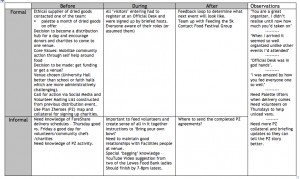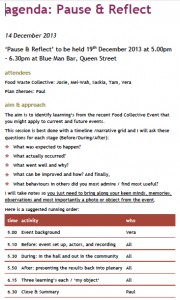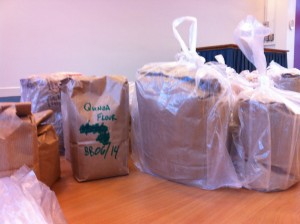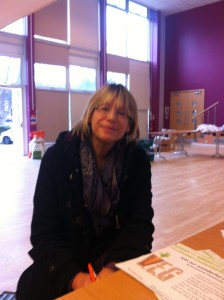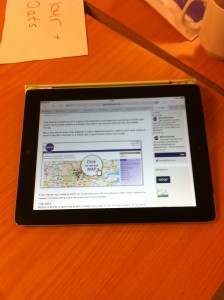David Gurteen rang me just before Christmas. He’d read my recent blog post about the Pause & Reflect (P&R) debrief session I was running for the Brighton Food Waste Colllective and wanted to understand how it differed from an After Action Review (AAR).
Here’s what I told him and via this link his observations on the technique:
In a P&R debrief the team (with the help of the Facilitator) is attempting to go beyond the questions posed by an AAR: what was supposed to happen; what did actually happen; what went well; and what might we do differently next time?
While these are valid areas of investigation they tend not to address the how or why an event succeeded or failed and overlook aspects of behaviour, space and culture.
P&R sessions look at all of these through the use of timelines and objects by recreating what happened formally and informally, before the event, during the event and after the event.
The technique I like to use is an A3 version of the Narrative Grid about which I’ve written before.
By way of an example (and with the kind permission of Vera, Mei-Weh and Saskia) I’d like to draw on the recent P&R session in Brighton.
Food Waste Collective Pause & Reflect:
We met informally at a quirky venue (Blue Man Bar) in Brighton. Despite background noise the team were able to raise and openly discuss the event. Here’s what I asked them to think about in advance:
The aim is to identify learning’s from the recent Food Collective Event that you might apply to current and future events. This session is best done with a timeline /narrative grid and I will ask these questions for each stage (Before/During/After):
* What was expected to happen?
* What actually occurred?
* What went well and why?
* What can be improved and how? And finally,
* What behaviours in others did you most admire / find most useful?
I will take notes so you just need to bring along your keen minds, memories, observations and most importantly a photo or object from the event.
some key outcomes:
The session designed primarily as a capacity building/knowledge transfer session lasted but an hour. In that time a couple of key outcomes emerged and each of the team was able to highlight behaviours in others that made a real difference. It underpinned my belief that by being appreciative in the approach to debriefs and focusing on events a lot more emerges.
Here’s an extract from the notes I took:
when, where and how to use a Pause & Reflect?
Here are 10 suggestions on how to make it work:
- use it to conduct a debrief on an event or decision that has taken place in the last month
- use pictures and objects from the event or decision to amplify key moments and trigger memories – brief them about the need to bring something along
- get people to fill in the narrative grid / timeline as they go and if you have different cultures involved ask different groups to fill in their own timelines – in the process of comparing you will discover much
- probe by asking for examples – in the above case the need to get volunteers on a Thursday to help unload FareShare vans emerged only by going through the event step by step
- when someone makes a comment such as ‘it was so organised when I arrived’ get them to elaborate and contrast – it will generate a story that becomes an important narrative of the event
- make the session informal (and reflective of the organisational culture) but do have an agenda and stick to it – be clear about the roles each one is playing at the P&R
- get participants to talk about the environment and location where the event or decision you are holding a P&R about took place
- don’t be afraid to let the silence hang in sticky moments – behaviours (most admired which might have made an event successful) often emerge slowly
- ensure (with permissions) that you take photos of the P&R and include them in the write up
- finally, don’t be too ambitious: 3 hours is the maximum I’ve found works and look at 1 event or decision not a whole project.

